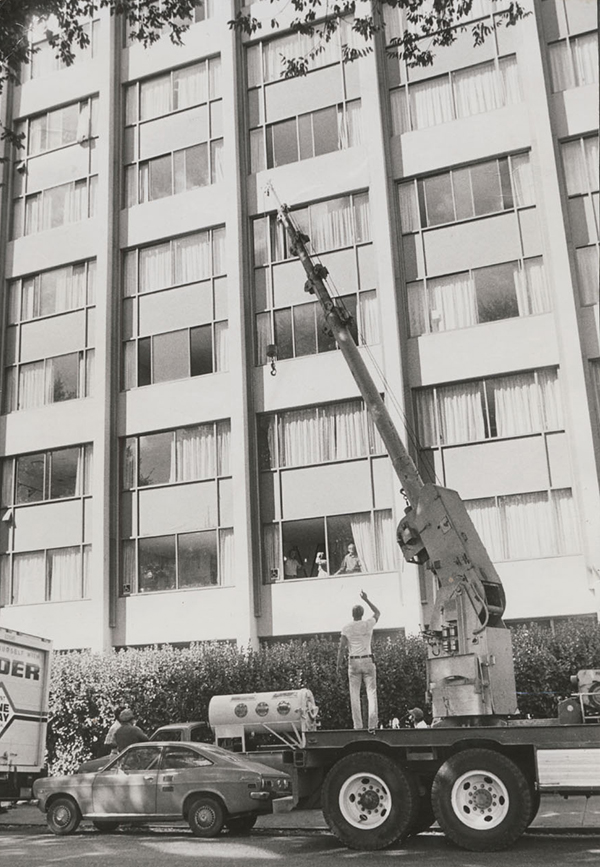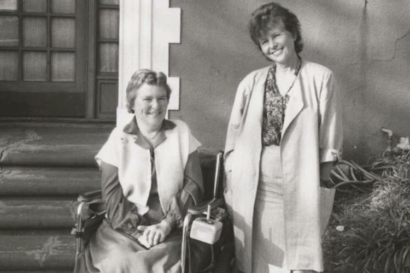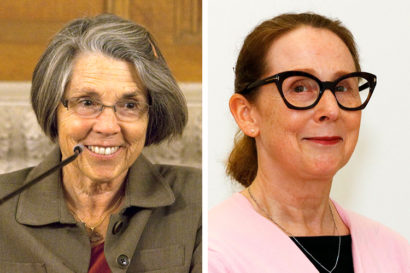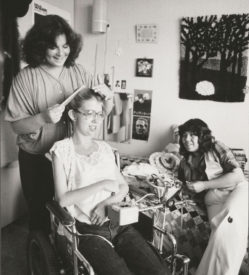It was 1997 and Jane Rosario, librarian at UC Berkeley’s Bancroft Library, was on her way to meet Mark O’Brien, a former Berkeley student with an extensive literary collection of his own works. He was a poet and journalist and larger than life – and it was Rosario’s job to collect his poems, essays, and book reviews for inclusion in the library’s archives on disability rights and the independent living movement of the 1960s and 1970s.
Mark O’Brien, after joining UC Berkeley in 1978 when he was almost 30. (Photo from Disabled Students’ Program Photo Collection, UARC PIC 2800H: 152, The Bancroft Library, University of California, Berkeley)
“Mark was a big star,” said Rosario. “I was really intimidated by him.”
O’Brien, paralyzed from the neck down after suffering from polio at the age of 6, was admitted to Berkeley in 1978 when he was almost 30 years old. His father Walter had fought for years to get his son admitted to Berkeley after reading about the campus housing program for students with physical disabilities. The program, funded by the California Department of Rehabilitation, set every student in a freshman year of college in a dormitory with a full-time worker – and paid the $ 12,000 bill. Although some scoffed at the cost, it was cheaper than living in a hospital and offered students something that many of them hadn’t had before: a chance to live independently.

A crane after lifting O’Brien’s iron lungs through his Davidson Hall dorm window in 1978. (Photo from Disabled Students’ Program Photo Collection, UARC PIC 2800H: 153, The Bancroft Library, University of California, Berkeley)
Rosario, who was a Berkeley student at the same time as O’Brien, recalls when a crane lifted his iron lungs – a 650-pound steel cylinder he needed to breathe – through his dorm window several stories above the floor. Although he spent much of his time in his iron lungs, O’Brien was able to attend classes in a specially designed wheelchair. He was typing on his computer with a mouth stick that he bit between his teeth to press the keys.
After earning his bachelor’s degree in English in 1982, O’Brien published his work in literary magazines and advocated disability rights. In 1990 he published Breathing, a collection of poems that gave readers an insight into his life – from the death of his sister to driving at night in a wheelchair on campus. In the same year he published an essay in Sun magazine entitled “On Seeing a Sex Surrogate”. It was a deeply honest first-person account of how he was exposed to his intense feelings of shame – his physical self and his sexuality. It gained national recognition and inspired the 1997 film The Sessions.
“I really admired him and his writing,” said Rosario. “I was just so in awe of him and I knew he could be pretty hot, so I was scared of meeting him. He was an intimidating person with or without an iron lung. “
When she got to O’Brien’s in Berkeley, Rosario thought it was a once-in-a-lifetime visit – she’d find the courage to sit down and talk to him, then collect his poems and essays for the archives, and move on to the next person. But it didn’t work out that way.

Susan O’Hara (left) was hired in 1975 in Berkeley as the coordinator of the Berkeley Disabled Students Program. (Photo from Disabled Students’ Program Photo Collection, UARC PIC 28H: 208, The Bancroft Library, University of California, Berkeley)
“He only gave me five poems every time I came to his house,” said Rosario. “He would let his assistant things go and he would go through every one of them with me. It was amazing. It became a long, ongoing thing. I visited him often. “
O’Brien’s literary works are housed in the Bancroft Library in the archives of the Disability Rights and Independent Living Movement, an extensive collection of personal documents, records from disability organizations in the Bay Area, and transcribed oral lore from leaders, participants, and observers of the movement’s gained momentum alongside those Civil Rights and Women’s Movements in the 1960s and 1970s.
The archives, like all social movements in history, didn’t just happen – they took immense effort and perseverance from campus activists to make them a reality.
It started with Susan O’Hara, who was hired as the coordinator of the program for disabled students at Berkeley in 1975. Under her direction, students with disabilities were moved from a campus hospital where they were previously housed to on-campus dormitories. In 1988, O’Hara was named director of the Disabled Students Program. The energy and activism regarding disability rights on campus and in the wider community was like nothing she had seen – a movement she believed deserved to be documented.

Ann Lage (left) was the manager of the archive project Disability Rights and Independent Living Movement and Jane Rosario the archivist. “It’s the best I’ve done in my professional life,” said Rosario of the project. (Photos courtesy of Ann Lage and Jane Rosario)
The director of the Regional Oral History Office, now Oral History Center at Bancroft Library, Willa Baum agreed. However, it took another decade for the center to find funding for the project through a three-year federal grant from the US Department of Education’s National Institute of Disability Rehabilitation Research.
The archive project had officially started by 1996. Rosario, the project’s archivist, worked with a small team of interviewers from the disabled community hired by Ann Lage, the deputy director of the Oral History Office who led the project. Interviewers included O’Hara, Mary Lou Breslin, Sharon Bonney, Denise Sherer Jacobson, Kathy Cowan, David Landes, Fred Pelka, and Lage, who conducted several post-fellowship interviews.

Don Lorence 1980 (Photo from Disabled Students’ Program Photo Collection, UARC PIC 28H: 144, Bancroft Library, University of California, Berkeley)
“There is a catchphrase in the disabled community: Nothing about us without us,” said Lage. “Although Jane and I were part of the project, it was thought, initiated, and basically carried out by people with disabilities who came on board as interviewers for oral history for the project. Without them we would not have been able to do our job. “
After the end of the funding cycle, the team received another grant to start a second phase of the project in which the scope was expanded to include key lawyers and organizations in the rest of California as well as in New York, Boston, Washington, DC, Texas focus and several other states in the 1960s through 1990s.
After eight years, the team interviewed more than 100 people whose oral records reveal the emergence of a powerful movement in Berkeley and across the country that made remarkable improvements for the disabled community, including the Disabled Americans Act, a federal civil rights law that was passed In 1990 – 30 years ago this year – this calls for equal rights and opportunities for people with disabilities in all areas of public life, including jobs, schools, transportation and all places open to the general public.

Herb Willsmore (left) and Ed Roberts attend a Cal football game in 1969. Both Willsmore and Roberts were interviewed for the archival project. (Photo from the Disabled Students’ Program Photo Collection, UARC PIC 2800H: 007, The Bancroft Library, University of California, Berkeley)
Respondents include Ed Roberts, a pioneer with severe disabilities who, after being admitted to Berkeley as a student in 1962, famously demanded to live on campus and opened the door to a wave of students with disabilities seeking the right to to live independently of other students. Roberts founded the Center for Independent Living in 1972, which became the model for similar centers across the country, and was appointed director of the California Department of Rehabilitation in 1975 by the then government. Jerry Brown.
Other oral traditions are that of Mary Lou Breslin, also interviewer of the project, who co-founded the Disability Rights Education and Defense Fund, a national center for law and politics, in 1979; Berkeley Alumna Judy Heumann, former assistant director of the US Department of Education and star of a new documentary, Crip Camp: A Disability Revolution; and Fred Fay, a Boston and Washington attorney who campaigned for accessible transportation and was instrumental in developing adaptive computing technology for people with disabilities.

In 1980 students relax in the dormitories. After being housed at Cowell Hospital, disabled students moved to the on-campus dormitories after Susan O’Hara became coordinator of the student dormitory program for the disabled in 1975. (Photo by Students with Disabilities) Program Photo Collection, UARC PIC 28H: 147, The Bancroft Library, University of California, Berkeley)
“In documenting a historical movement, we felt we were breaking new ground, as the Berkeley disability rights movement had done,” said Rosario. “And there we were with the people who wrote this story. I just don’t think that as an archivist or oral historian, you have that many opportunities. It was just amazing. It’s the best thing I’ve done in my professional life. “
In 2000, the Bancroft Library opened the first phase of the Disability Rights and Independent Living Movement archive, documenting movement on campus and in the Bay Area. O’Hara, who retired from Berkeley in 1992, spoke to Berkeley News about the efforts and how they would serve the public.
“This collection will enable historians and scholars to document the transition from a time when people with disabilities were viewed as objects of charity in need of medical supervision, to people in control of decisions that affect their own lives “said O’Hara, who died in 2018 at the age of 80.
The complete collection of the Disability Rights and Independent Living Movement archives, documenting the Berkeley and United States movement from the 1960s to the 1990s, is available on the Bancroft Library website.
For an overview of the Berkeley disability rights movement, see O’Hara’s article “Fertile Soil: The Berkeley Campus and Disability Matters,” published in the University of California Chronicle in 2009.

In the 1970s, students passed Sather Gate on the Berkeley campus. (Photo from Disabled Students’ Program Photo Collection, UARC PIC 28H: 001, Bancroft Library, University of California, Berkeley)

